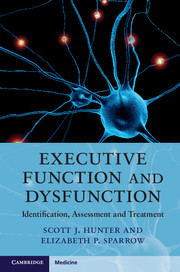Book contents
- Frontmatter
- Contents
- Editor biographies
- List of Contributors
- Preface
- Acknowledgments
- Introduction
- Section I Foundations of Executive Function/Dysfunction
- Section II Executive Dysfunction in the Neurodevelopmental and Acquired Disorders
- Introduction to Section II
- Chapter 5 Executive functions in disruptive behavior disorders
- Chapter 6 Executive functions in autism spectrum disorders
- Chapter 7 Executive functions in intellectual disability syndromes
- Chapter 8 Executive functions in pediatric movement and motor control disorders
- Chapter 9 Executive functions in learning disorders
- Chapter 10 Executive functions in mood and anxiety disorders
- Chapter 11 Executive functions in childhood epilepsy
- Chapter 12 Executive functions in pediatric cancer
- Chapter 13 Executive functions in HIV
- Chapter 14 Executive functions and neurotoxic exposure
- Chapter 15 Executive functions after congenital and prenatal insults
- Chapter 16 Executive functions in acquired brain injury
- Section III Applications
- Appendix 1 Abbreviations used in the book
- Appendix 2 Tests/tasks referenced in the book
- Index
- References
Chapter 12 - Executive functions in pediatric cancer
from Section II - Executive Dysfunction in the Neurodevelopmental and Acquired Disorders
Published online by Cambridge University Press: 05 October 2012
- Frontmatter
- Contents
- Editor biographies
- List of Contributors
- Preface
- Acknowledgments
- Introduction
- Section I Foundations of Executive Function/Dysfunction
- Section II Executive Dysfunction in the Neurodevelopmental and Acquired Disorders
- Introduction to Section II
- Chapter 5 Executive functions in disruptive behavior disorders
- Chapter 6 Executive functions in autism spectrum disorders
- Chapter 7 Executive functions in intellectual disability syndromes
- Chapter 8 Executive functions in pediatric movement and motor control disorders
- Chapter 9 Executive functions in learning disorders
- Chapter 10 Executive functions in mood and anxiety disorders
- Chapter 11 Executive functions in childhood epilepsy
- Chapter 12 Executive functions in pediatric cancer
- Chapter 13 Executive functions in HIV
- Chapter 14 Executive functions and neurotoxic exposure
- Chapter 15 Executive functions after congenital and prenatal insults
- Chapter 16 Executive functions in acquired brain injury
- Section III Applications
- Appendix 1 Abbreviations used in the book
- Appendix 2 Tests/tasks referenced in the book
- Index
- References
Summary
Cancer is the leading cause of death by disease in children under the age of 15 years. Brain tumors and acute lymphoblastic leukemia (ALL) are the two most common forms of pediatric cancer, collectively accounting for more than half of all newly diagnosed cases annually. Most research into the neuropsychological sequelae of pediatric cancer and its associated treatment has involved the study of ALL and brain tumors because of their high prevalence as well as their greater associated neuropsychological morbidity. This morbidity has become increasingly prevalent as survival rates for ALL and brain tumors have improved over the last several decades.
The neuropsychological sequelae of pediatric cancer extend into adolescence and adulthood and are not only associated with the cancer itself but the treatments employed, including surgical intervention, chemotherapy, cranial/craniospinal radiation therapy (CRT), or a combination of these treatments. Other disease- and treatment-related outcome moderators include neurologic complications (e.g., intracranial bleeding, hydrocephalus, leukoencephalopathy) and sensorimotor deficits related to the primary disease and/or to iatrogenic effects. CRT, in particular, has been one of the greatest contributors to improved survival in the treatment of brain tumors and higher risk forms of ALL, but it has also been associated with numerous neurologic and neurocognitive effects that vary according to the extent and location of CNS involvement, size of area irradiated, and total dose administered. Intrathecal and high-dose intravenous chemotherapies, particularly methotrexate, are now routinely employed without adjuvant radiation in the treatment of standard-risk ALL. While evidence regarding the neuropsychological risk associated with such isolated chemotherapy is mixed, it is generally acknowledged that both intrathecal chemotherapy and the chemotherapy agents administered in the treatment of various brain tumors have a less significant effect on neuropsychological outcome than does CRT.
- Type
- Chapter
- Information
- Executive Function and DysfunctionIdentification, Assessment and Treatment, pp. 158 - 167Publisher: Cambridge University PressPrint publication year: 2012



